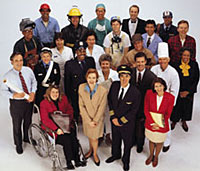|
 Career Planning:
Many poor career decisions have been made because there
was not enough research completed on the position
beforehand. The Successful Career Planning report is a
good starting place to increase understanding about the
potential career you choose. Career Planning:
Many poor career decisions have been made because there
was not enough research completed on the position
beforehand. The Successful Career Planning report is a
good starting place to increase understanding about the
potential career you choose.
High School
Successful Career Planning™ can and should begin as
early as 11th grade. Many high school students are
already thinking of college and beyond. As parents it's
up to us to guide our children into becoming happy,
healthy and productive members of our ever-changing
society. Wouldn't it be wonderful if we could also help
our children find that dream career that will fulfill
not only their financial needs, but their emotional
needs as well? Where they would enjoy going to work,
actually like their job, and when they are home for the
day, to enjoy their family even more.
College
Many college students' still struggle and wonder if they
are in the right academic program. "Have I chosen
wisely?" "Will I change my major...again?" Even at this
level, Successful Career Planning is a must!
Understanding how they approach problems & challenges,
their interaction with people, dealing with the pace of
their environment or following rules set by others can
mean the difference between a successful career, or a
struggling job.
 Adults in Career Transition Adults in Career Transition
Most adults will change careers 5 times during their
lifetime. Many will fall into the definition of
insanity... "Doing the same things over and over,
expecting different results." They leave one job, to go
to another similar position, only to find they are NOT
happy with their new job. Determining if a career change
is right for you is a process in which the discovery of
your personal strengths, motivations, and goals are of
the utmost importance. If a career change is the right
thing for you, you need to be sure you are making the
right change.

 Employee
Development: Computers have manuals-Why
Not People? People are unique and must be managed,
coached and supported in a way that capitalizes on their
uniqueness. Proper guidance and direction often spell
the difference between success and failure of an
employee, a team or an organization. Employee
Development: Computers have manuals-Why
Not People? People are unique and must be managed,
coached and supported in a way that capitalizes on their
uniqueness. Proper guidance and direction often spell
the difference between success and failure of an
employee, a team or an organization.
Job Benchmarking...What
behavior does the job require
Benchmarking is a process human resource professionals
use to identify potential top performers based on facts
gathered through validated assessment instruments. A
benchmark can be created based on an ideal behavioral
style of a position or the behavioral and attitudes
styles of top performers versus bottom performers. This
information can make the selection process more accurate
and cost effective.
Sample TTI
Success Insights™ Management-Staff Version Report
When benchmarking for a position, AIA
offers The Success Insights Work Environment™ report
which is used to identify the ideal behavioral style the
position requires.
Sample TTI
Success Insights Work Environment™ Version Report
When benchmarking the ideal attitude
style for a position, AIA offers the Personal Interests,
Attitudes and Values™ report. This will identify a
pattern in the attitudes rankings for top and bottom
performers and provide valuable statistics to include in
the employee selection process.
Sample Personal Interests, Attitudes and Values™ Report
Our Newest Assessments combine the
DISC & PIAV in a comprehensive assessment of both
behavioral needs and personal motivations to better
understand the needs of the position, and the talents of
the new hire.
Sample TTI Job Insights™ & TTI Talent Insights™
Employment Agencies & Outplacement
Firms
Using assessments such as the Managing For Success®
series, can give invaluable information about an
individual. This can and will assist in properly placing
a person within a new industry and organization. After
all, fitting the right person with the right job is
essential in assuring a renewed sense of career success.
Another benefit to you is the enjoyed greater reputation
for supplying better fitting employees to your clients.
The ability to interact effectively
with people may be the difference between success and
failure in our work and personal life.
Sample TTI
Success Insights™ Management-Staff Version Report
An individual's performance and
attitude in the workplace can be directly related to
their internal value system. Before making a career
change, it is important to understand the values that
drive your actions.
Sample Personal Interest, Attitudes and Values™ Report
The Successful Career Planning™
report offers a system to capitalize on the individual's
talents, as well as their potential strengths and
specific value to the organization. The report also
provides a list of potential occupations that may suit
the individual's natural behavioral style.
Sample Career
Planning Insights Report
 Franchise
Development: The Short Term Gain of
adding Franchise Units can backfire if the
Owners/Operators of those units are not a "Good Match"
for the franchise system. An understanding of behavioral
selling skills can increase the success of your
franchise development department in meeting your goals. Franchise
Development: The Short Term Gain of
adding Franchise Units can backfire if the
Owners/Operators of those units are not a "Good Match"
for the franchise system. An understanding of behavioral
selling skills can increase the success of your
franchise development department in meeting your goals.
Franchisor Benefits with
Behavioral Selling
Knowing how to communicate with your prospective
franchisee is vital in helping them to understand if
your franchise is right for them and if they are right
for your franchise. That is why you "Award" a franchise
to the right prospect. After all "Their success is Your
success"!
Investing in a franchise is also an emotional decision
as well as financial. By developing a Successful
Franchisee Education Program, you will better qualify
your prospects and increase your closing potential. By
your understanding and using behavioral selling skills
during your sales process, you can help your prospect
overcome the emotions and by speaking their language,
create a better doorway to communication.
Sample Communicating With Style™
Sample
Interviewing Insights™ - General
Franchisee Benefits
The biggest difficulty is not finding financially
qualified prospects, but in finding prospects that have
the inner confidence to move forward. Of all those who
investigated and validated their opportunity fully, and
whom the franchisor really wanted as franchisees, but
who failed to move forward, (80%) most dropped out
because they themselves perceived they did not have the
right personality for the business and were fearful they
could not be successful.
Franchisors can overcome this
problem if they:
Help reduce the emotional fears and increase the
confidence level of the most desirable prospects.
Support and employ quantitative (behavioral) data to
predict the capacity for success each candidate for
their particular franchise system.
Franchisors will have a greater
success rate if they
Be selective in awarding of franchise units by focusing
on the ability, willingness and behavioral competencies
of your prospects.
Reduce the fear of your best prospects by demonstrating
to them how their personality based on behaviors, values
and attitudes as well as specific related soft skill
competencies can be an asset to their eventual success
in the business.
Use validated assessment tools to quantify what
personality characteristics are present in your best
franchisees, and then show your best prospects how THEY
fit that profile.
Sample TTI Success
Insights™ Executive Version
Sample TTI Success Insights™ PIAV Version |